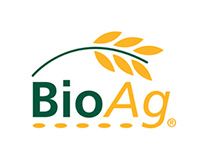Canola
Canola refers to the seed and oil that is produced by several cultivars of the rape plant, generally cultivars of either rapeseed (Brassica napus L.) or field mustard/turnip rape (Brassica rapa subsp. oleifera, syn. B. campestris L.). Canola now dominates the consumption markets for oil and meal and is grown in the United States, Canada and Australia as well as in Europe and China.
Specific considerations for Canola
Total plant biomass directly relates to yield while use of chemical fertilisers is shown to negatively impact emergence.
A BioAg program looks to reduce the requirement for starter fertiliser while also ensuring adequate nutrients, in particular nitrogen and sulphur, are readily available to encourage early plant growth. The use of biostimulants is included to promote emergence and early growth, with foliar applications recommended to drive vegetative growth and later flowering and seed set.
A BioAg program will target improvement in soils that will enhance nitrogen fixation, cycling and uptake, reducing nitrogen loss pathways and providing improved utilisation and plant uptake at lower rates of N fertilisation. For organic systems, improving nitrogen fixation from atmosphere, cycling and plant uptake are key aspects of successful crops.
The BioAg approach
BioAg nutrition programs are incorporated into a growers current nutrition program. Our objective is to make fertiliser and other inputs work better and build and support healthy and balanced soils and plants. Programs are custom-made for each block, using advanced soil and tissue analysis. These integrated programs typically incorporate a range of BioAg solid and liquid nutrients, often associated with conventional inputs. BioAg fertility programs can be developed to meet organic certification requirements.
Soil test
An experienced and Fertcare accredited BioAg agronomist works with you and provides technical expertise on your crop. If you don’t already have recent soil test data, we arrange a soil test for you. The results provide essential information about the soil fertility and soil structure for better performance. Download the BioAg soil sampling procedure here.
A tailored program
Based on the results of soil tests, crop requirements and other factors such as soil structure, climate, history of the block, and targets that you are trying to achieve, we provide a tailored program that aims to improve soil fertility and maximise yield response. We support you through the program to ensure that inputs are applied at the right time, in the right way.
Leaf and tissue testing
Any nutritional program cannot foresee the changes in weather, disease, or pests, that may impact a crop. During the season, growers may observe issues or evidence of stress in their crop. This may be due to greater growth or yields than planned, a trace element shortage or abiotic stresses. An on-farm inspection and associated leaf or tissue tests will promptly identify any issues, which can quickly be addressed by applying the appropriate inputs. Download the BioAg leaf sampling procedure here.
High yielding crops require fertile balanced soils
Key to highly productive crops is the function of soils. Soil structure, chemistry and biology are critical in supporting crops throughout the growing season. By improving all aspects of the soil, crops will benefit from improved access to moisture, due to improved infiltration and water holding capacity, improved access to nutrition through improved nutrient cycling, fixation (for N) and a reduction in loss pathways, improved resilience to abiotic stresses and disease, improved root growth providing access to additional moisture and nutrients as well as improved carbon sequestration and a range of other benefits (click for more on soil health).
Beneficial microorganisms stimulate the plant’s root growth and help protect it from abiotic stresses. This is made possible through mutually beneficial relationships that microbes develop with plants, for example mycorrhizal associations. BioAg products programs supply essential macronutrients (N, P, K, S, Ca), trace elements (B, Zn, Cu etc.), microbial food and metabolites beneficial microorganisms that colonise root systems, improving soil function, plant health and productivity.

Canola – key features of a BioAg program
The following table illustrates the cropping process and potential solutions depending on soil test results and other contributing factors. Call your BioAg Area Manager to discuss your individual needs.
Canola resources
- Biostimulants increase yield
For the past four years, BioAg Agronomist and Area Manager Pete Emerson has been conducting a large-scale biostimulants demonstration with a grower near Brocklesby, southern NSW. The innovative grower is keen to explore ways to combat soil constraints and improve crop y...
- Soil-nutrient relationships
Nutrients, such as calcium and magnesium, may be supplied to plants solely from reserves held in the soil. Others like phosphorus and nitrogen are added regularly to soils as fertiliser to be withdrawn as needed by crops.
- Biostimulants to the rescue – enhancing fertiliser efficiency
Nitrogen Use Efficiency (NUE) is the term used to describe the effectiveness of nitrogen uptake by plants, whether it be nitrogen latent in the soil, sequestered from the air, or applied as fertiliser.
- Biostimulants increase yield benefits
The yield map from the Summer 2023 harvest near Brocklesby in Southern NSW visibly shows the positive impact of BioAg’s biostimulant program on yield.
- BioAg in the field
A recent field visit by some of the BioAg team to a canola Demonstration crop in Southern NSW that is utilising a bespoke BioAg soil health program - it’s looking the goods, given heads and shoulders only in view.
- Demos and trials
BioAg continues to participate in ongoing demonstrations with growers and independent trials where needed. The coming season is no different, with both long term trials and demos in pastures being planned or continued. We are part way through a 3 year wheat and canola t...
- Capital P in Broadacre Cropping and Pasture
In broadacre cropping and pasture, the last two seasons in Victoria and New South Wales have been exceptional. As a result, when considering your fertiliser requirements for 2022, it is important to consider the amount of nutrients your crops or livestock have removed. ...
- Mixed farming case study, Manildra NSW
A biological soil nutrient program has dramatically improved the productivity and general well-being of a mixed farming enterprise operated by the Watts family in Central West NSW. Charlie and Jenny Watts, together with their son and daughter-in-law, Andrew and Tina Wat...
Recommended products
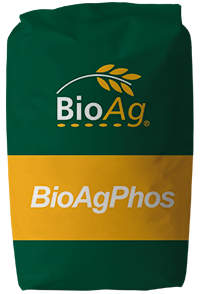
BioAgPhos
Solid Fertiliser
Highly reactive phosphate fertiliser made from high-grade reactive phosphate rock combined with BioAg’s microbial digesting agent.
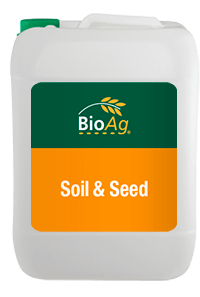
Soil & Seed
Biostimulant
Formulated to improve soil microbial activity, natural soil fertility and moisture and nutrient utilisation.
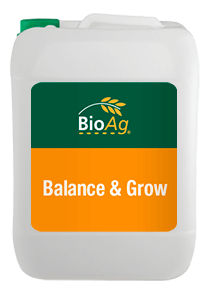
Balance & Grow
Biostimulant
Formulated to increase vegetative growth, root development and soil microbial activity. Ideal for broadacre, pastures and horticulture.
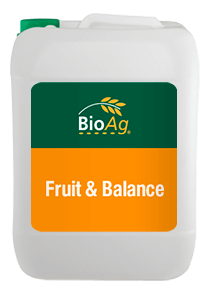
Fruit & Balance
Biostimulant
Formulated to increase flowering, fruit set and soil microbial activity. Fruit & Balance enhances the nutritional value and quality of fruit or grain by increasing plant sugar levels.

Committed to organics
With a core range of natural fertilisers and biostimulants, BioAg can offer an extensive range of products certified by Australian Organics, suitable for use in organic systems.
